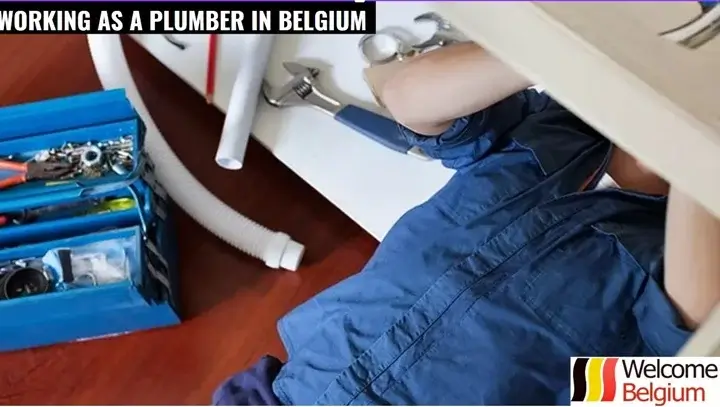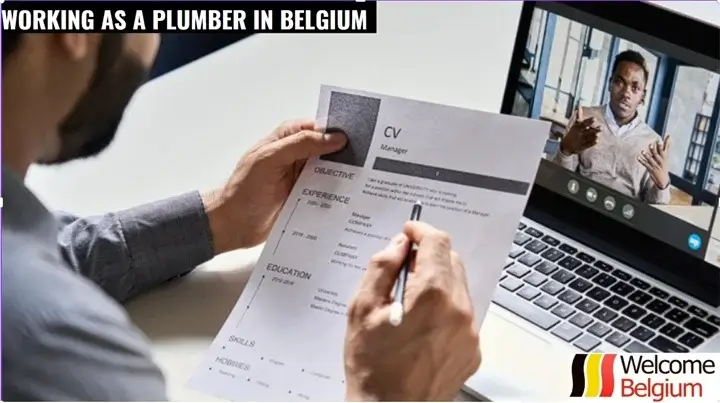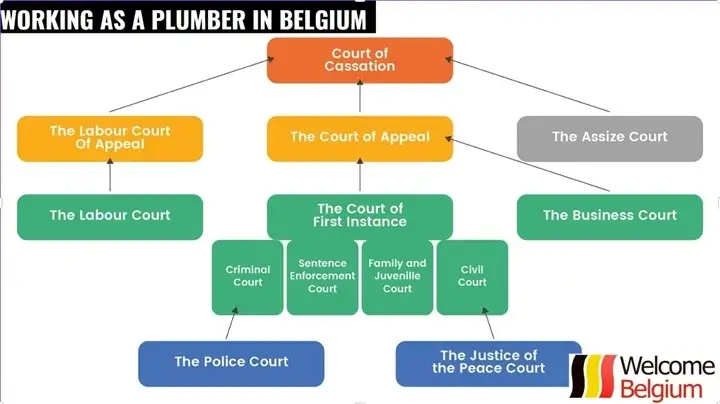Plumber jobs in Belgium are in steady demand due to the development of construction and renovations throughout the country. The labor market here offers many opportunities for skilled professionals, especially those who are willing to be formally employed and comply with local regulations. Plumber jobs in Belgium are available for both locals and migrants, and the working conditions and salaries make this profession attractive to many. If you are considering a move and want to find a real job with decent pay, understanding the specifics of plumber jobs in Belgium is the first step to success.
Requirements for plumbing in Belgium
To work as a plumber in Belgium, it is important to have relevant skills and experience. Employers usually require proven experience of 1 to 3 years and a basic technical education. Certificates and licenses are welcome – they confirm qualifications and help you get a job faster.
Plumbing requirements in Belgium:
For the locals:
- Education and Experience:
– Vocational diploma in plumbing or related field (e.g., construction, engineering).
– Minimum 1-3 years of practical experience as a plumber. - Certificates and licenses:
– Certificate of competence (Attestation de compétence / Getuigschrift van bekwaamheid) – confirms professional skills.
– A license for certain types of work (e.g. gas systems) is mandatory. - Knowledge of languages:
– National languages: French (Walloon region), Dutch (Flanders), German (German-speaking region).
– Language proficiency at a level sufficient for reading technical documentation and communicating with customers. - Official employment:
– Contract work, official registration with social security.
– Compliance with safety regulations (see Belgian Labor Code, section on occupational safety). - Regional specificities:
– Requirements may vary: for example, in Flanders there is more emphasis on Dutch language and licenses, in Wallonia there is more emphasis on French.
For immigrants:
- Legal work and residence permit:
– Residence permit with the right to work (Type B residence permit or Type B work permit or C). More information – Official website of the Belgian Migration Service: https://www.dofi.ibz.be - Education and qualifications:
– Recognition of a foreign diploma in Belgium (evaluation of qualifications through NARIC or local bodies is encouraged).
– If the diploma is not recognized, it is possible to validate the qualification through courses or examinations organized by regional educational institutions. - Language requirements:
– To work effectively, a basic level of French, Dutch or German. For confirmation – language tests, e.g. Certificat Linguistique.
– English can help, but does not officially replace local languages. - Certificates and licenses:
– You need to get Belgian certificates of competence, especially if you plan to work with gas or electrical systems.
– There are special courses and examinations for this (e.g. CEB – Centre d’Évaluation Belge). - Official employment:
– Conclusion of an employment contract with the employer.
– Registration with the social security and tax authorities.
– Compliance with safety rules and regulations (see Belgian Labor Law for details:
For official employment you need to know at least one of the official languages – French, Dutch or German, and English would be a big plus. Without basic language skills it is more difficult to find a good job.
Find out more about salaries in Belgium.
Communication with customers and colleagues is a key aspect of the profession. It is also worth considering that the requirements depend on the region, as Wallonia and Flanders have their own particularities.
Important:
In Belgium, a plumber can work as a freelancer – that is, for himself, without a permanent employer. The main thing is to formalize your activity and comply with all the rules on licenses and taxes.
How to find a job as a plumber in Belgium
Finding a job as a plumber in Belgium can be quick if you know where to look and how to present yourself. The main thing is to write a competent resume, choose reliable channels and work only under an official contract. Here’s a step-by-step guide to each step.
Writing a resume
The first thing to start with is a resume. Without a well-written document, even a great specialist can be overlooked for a vacancy. Employers in Belgium like clarity and specificity, so a plumber’s CV should be clear, neat and structured.
Here’s what to be sure to include:
- Contact information: name, phone number, email, city of residence.
- Brief description of the profile (2-3 sentences): who you are, how many years in the profession, what are your main skills.
- Work experience: list the most recent jobs, company name, timeframe, what you did (e.g., installing heating systems, working with PEX and PVC pipes, repairing leaks, etc.).
- Education and courses: Vocational training, plumbing courses, retraining are all worth mentioning. If you have Belgian certificates, that’s a plus.
- Skills: soldering, threading, working with blueprints, installing plumbing fixtures, etc.
- Languages: even if the level is basic, write – French, Dutch, English.
- Additional information: availability of driver’s license, personal tools, readiness for business trips and night shifts.
Don’t forget to get everything on one sheet of paper, without any unnecessary stuff. English or the language of the region (French or Dutch, depending on the place) is best.
Once your resume is ready, move on to the next step – finding a job in Belgium.
Need to find a job in Ghent, Belgium? Find out how to do it in this article.
Example:
Oleksandr from Lviv found a job as a plumber in Leuven in just one week after he had written his CV well: he clearly indicated his experience, skills, added a photo and mentioned his willingness to learn the language. He was invited through the Randstad agency and the manager immediately commented that “at last everything was clear and to the point”. He is now officially employed, living in Haahta and helping his brother find a job.
Plumber job search in Belgium
Once your CV is ready, it’s time to start actively looking for a job in Belgium. You should not limit yourself to one method – it is better to combine several channels at once. In this way, your chances of finding a decent plumber vacancy increase dramatically.
Here are the main paths the masters are taking:
- Job sites
The fastest way is to monitor online platforms that regularly publish offers across the country.- Indeed Belgium
Website: https://www.indeed.be
Easy filter by city, contract and language.
Contacts: no office, all online. - VDAB (Flanders)
Website: https://www.vdab.be
For registered users – help with CVs and advice.
Phone: 0800 30 700
Address: Keizerslaan 11, 1000 Brussel - Le Forem (Wallonia)
Website: https://www.leforem.be
Specializes in French-speaking jobs.
Phone: 0800 93 947
Address: Boulevard Tirou 104, 6000 Charleroi - Actiris (Brussels)
Website: https://www.actiris.brussels
Free help for the unemployed, including immigrants.
Phone: 0800 35 123
Address: Avenue de l’Astronomie 14, 1210 Bruxelles
- Indeed Belgium
- Employment agencies
Both temporary and permanent jobs with an official contract can be found through such agencies.- Randstad
Website: https://www.randstad.be
Phone: +32 2 506 61 11
Address: Tour & Taxis, Havenlaan 86c B414, 1000 Brussel - Adecco Belgium
Website: https://www.adecco.be
Phone: +32 2 743 29 00
Address: Avenue des Olympiades 2, 1140 Evere - Start People
Website: https://www.startpeople.be
Phone: +32 2 558 08 60
Address: Rue de la Loi 26, 1040 Bruxelles
- Randstad
- Social networks and groups
Especially Facebook – there are tons of active communities like “Jobs in Belgium”, “Plumbers Belgium”, “Job offers Belgium”. Often real offers are posted there directly from employers. - Personal connections and recommendations
If you already know someone in the country, don’t hesitate to ask for advice or leads. Often plumber vacancies don’t make it to job sites – people are taken “by word of mouth”.
When using these channels, be sure to check whether you are officially employed. Without a contract, you are not protected, you will not get insurance, and there may be problems with documents.
In a nutshell, looking for a job in Belgium requires activity, persistence and attention to detail. The more channels you use, the quicker you will find a decent employer.
Tip:
Don’t waste your time with random ads – bet on trusted sites and agencies with official contracts.
Salary and working conditions of a plumber
The average salary for a plumber in Belgium ranges from €2,200 to €3,200 per month before taxes, depending on region, experience and employer. Bonuses for overtime, weekend work and complex tasks are often added to the salary.
| Region / City | Average salary, euros per month (before taxes) | Notes |
| Flanders | 2 500 – 3 200 | Highest level of payment |
| – Antwerp | 2 700 – 3 300 | Major industrial center |
| – Ghent | 2 600 – 3 100 | Active construction |
| – Bruges | 2 500 – 3 000 | Tourism affects the labor market |
| Wallonia | 2 200 – 2 800 | Salaries are lower than in Flanders. |
| – Liège | 2 300 – 2 900 | Large industrial and transportation hub |
| – Namur | 2 200 – 2 700 | Administrative center of the region |
| Brussels (metropolitan area) | 2 600 – 3 100 | High demand, good pay |
| – Brussels city | 2 700 – 3 200 | A lot of international companies |
The work schedule is usually a standard five-day schedule from 8:00 to 17:00, but night shifts and trips to accidents are possible. The advantages of the profession include stable demand for specialists and the opportunity to work officially with a full social package. Minuses – physical strain, the need to constantly update skills and be ready for non-standard situations.
Here’s a detailed list of the working conditions of a plumber in Belgium:
- Work schedule
Typically a standard five-day, 8:00 a.m. to 5:00 p.m. schedule, but shifts, overnight trips to accidents, and weekend work are available if needed. - Official employment
Almost all employers provide contractual employment with an official salary, which guarantees social guarantees and insurance. - Physical strain
The job requires constant physical labor – lifting heavy weights, working in awkward positions, at heights or in confined spaces. - Training and continuing education
To stay competitive, plumbers need to periodically take courses and familiarize themselves with new technologies and standards. - Safety in the workplace
It is important to follow safety procedures and use protective clothing and equipment. - Ability to travel and work at sites across the country
Occasionally travel to sites in other cities and regions, which requires mobility and willingness to relocate frequently. - Team and individual format of work
Sometimes you work in a team with other specialists, sometimes on your own – it depends on the project. - Salary and bonuses
In addition to the base salary, additional payments for overtime, weekend and holiday work, and bonuses for quality of work are possible. - Social guarantees and taxes
Includes paid vacations, sick leave, pension contributions and health insurance. - Career opportunities
As you gain experience, you can move up to higher positions, such as foreman or project manager.
Social guarantees include sick pay, vacation pay and pension contributions, which come from taxes and employer contributions. In Belgium, taxes are quite high, but at the expense of this there is a quality system of health care and social support.
Are you looking for a job in Leneve, Belgium? Find out about all the ways to get a job in this city.
Plumber jobs in Belgium can be found not only through websites and agencies, but also through social networks – for example, groups on Facebook or LinkedIn often post fresh vacancies. Don’t forget about acquaintances and colleagues: recommendations and personal connections here really help to reach the employer faster and get good conditions. This “human factor” is often more important than just responding to ads.
Example:
My friend Vitaly from Brussels had been looking for a job as a plumber for a long time and could not get a stable contract. He started telling everyone he knew that he was looking for a job, and after a couple of weeks one of his friends recommended him to his firm. Vitaly was immediately invited for an interview, and a week later he was already working with an official contract and all social guarantees. He says that personal contacts in Belgium really help – sometimes it is quicker and more reliable than any website.
Legalization and execution of documents
To be legally employed as a plumber in Belgium, you must have the appropriate documents – visa, work permit and residence permit (LPR). Without them, it is impossible to work officially, and failure to obtain the correct documents can lead to fines and deportation.
List of ways to legalize working as a plumber in Belgium with detailed descriptions:
- Work visa (type D)
If you are not from the EU, you must first obtain a long-term work visa. This is issued at the Belgian consulate in your country upon invitation from your employer. The visa allows you to enter the country and start the rest of the paperwork process. - Work permit (Permis de travail / Werkvergunning)
The permit confirms your right to work legally in Belgium. In most cases, your employer will apply for a permit on your behalf. Without this document, you cannot be officially employed. - Residence permit (VNZh)
Once you have entered the country and obtained a work permit, you must apply for a residence permit. This confirms your legal stay and employment. To apply for a residence permit, you need to go to the municipality of your place of residence with your passport, contract with your employer and other documents. - Status as an EU/EEA citizen or family visa holder
If you are an EU or EEA citizen, a work permit is not usually required – registration with the local authorities is sufficient. Family visa holders are also allowed to work without additional authorization. - Self-employment and registration as an independent entrepreneur
If you plan to work for yourself, you must register with the Belgian commercial register as an independent entrepreneur and obtain a residence permit. This is suitable if you plan to carry out plumbing work on a contractual basis. - Programs for skilled workers and seasonal workers
Accelerated permit and residence permit programs are available for professionals with proven qualifications. Seasonal workers receive temporary permits for a limited period of time.
The first step is to obtain a visa for work if you are not an EU citizen. Usually it is issued through the Belgian consulate in your country, having provided an invitation from your employer and other necessary documents. Next, you need to obtain a work permit, which is usually prepared by the employer.
In this article, you can learn about finding a job in Antwerp.
After arriving in Belgium, it is important to obtain a residence permit, which confirms the right to legally live and work in the country. To do this, you need to apply to the local municipality (commune/gemeente) of your place of residence with a package of documents: passport, contract with your employer, proof of residence and others.
The paperwork takes time and attention to detail, so it is worth consulting with your employer or immigration specialist beforehand to avoid mistakes and delays.
Tip:
Always check the deadlines and requirements for each document in advance to avoid delays and problems with legalizing your work in Belgium.
Relocation and adaptation to the country
Moving to Belgium to work as a plumber is an important step that requires careful preparation. First of all, you should think about housing: in big cities, rent can be expensive, so many people choose housing in the suburbs or look for rooms through specialized websites and groups for migrants. After moving, make sure to take out health insurance – in Belgium it is compulsory and covers most medical services.
Adaptation in a new place is not only related to everyday life, but also to cultural peculiarities. It is important to realize that Belgium has three official languages – French, Dutch and German, so knowing at least one of them will make communication and job search much easier. In addition, punctuality and respect for personal space are valued here.
Detailed advice on how to adapt in Belgium after moving:
- Learn the basics of the local languages – French, Dutch or German. Even a basic knowledge helps in everyday communication and work.
- Find housing through trusted migrant sites and communities to avoid scammers and unforeseen problems.
- Take out health insurance as soon as possible – it is mandatory and provides access to quality healthcare.
- Get to know your neighbors and local community – it will help you get used to it faster and get helpful tips.
- Observe local rules and traditions – for example, punctuality and respect for personal space are very important.
- Use public transportation – it is developed and will help you quickly navigate in a new city.
- Keep in touch with compatriots – socializing with people who have gone through the same experience makes it easier to adapt.
- Don’t be afraid to ask questions – local administrations and services often have multilingual staff ready to help.
- Plan your budget with realistic prices for housing, food and transportation – this will help you avoid financial hardship.
- Find a hobby or enroll in classes to meet new people and feel a sense of community.
- Be patient – adapting takes time, and it’s normal to feel stressed or nostalgic at first.
Living in Belgium involves getting used to local customs and laws, so it is worth learning the basic rules and peculiarities of social life beforehand. Supporting the migrant community and participating in local activities can help you settle in quickly and make new friends.
Frequently Asked Questions
Q: What are some tips for plumbers to find a job in Belgium faster?
A: It is recommended to prepare your CV thoroughly, use job sites and agencies, and actively search for jobs through social networks and personal connections.
Q: Where is the best place to look for plumber jobs in Belgium?
A: The main resources are sites like Indeed, StepStone, as well as employment agencies and professional groups on Facebook and LinkedIn.
Q: What documents are needed for official employment in Belgium?
A: To work legally, you need a work visa (if you are not from the EU), a work permit, a residence permit and an official contract.
Q: What health insurance do I need to take out after moving?
A: It is mandatory to take out public health insurance (mutuelle / ziekenfonds), which covers most medical services in Belgium.
Q: What tips for adapting to Belgium will help you settle in faster?
A: Learn the local language, observe local rules and traditions, communicate with locals and compatriots, and use public transportation and participate in local life.
Q: Where can I get help with employment and adaptation?
A: Useful resources are municipal employment centers (VDAB, Forem, Actiris), community organizations for migrants and specialized agencies.
Working as a plumber in Belgium offers real opportunities for stable income and professional growth. In order to find a successful job, it is important to prepare your CV thoroughly, use different job search methods and prepare all the necessary documents. Moving and adaptation will require time and effort, but the right approach will help you quickly get used to and feel comfortable in a new country. If you follow the advice and are persistent, working in Belgium will be a great step for your career and life.






